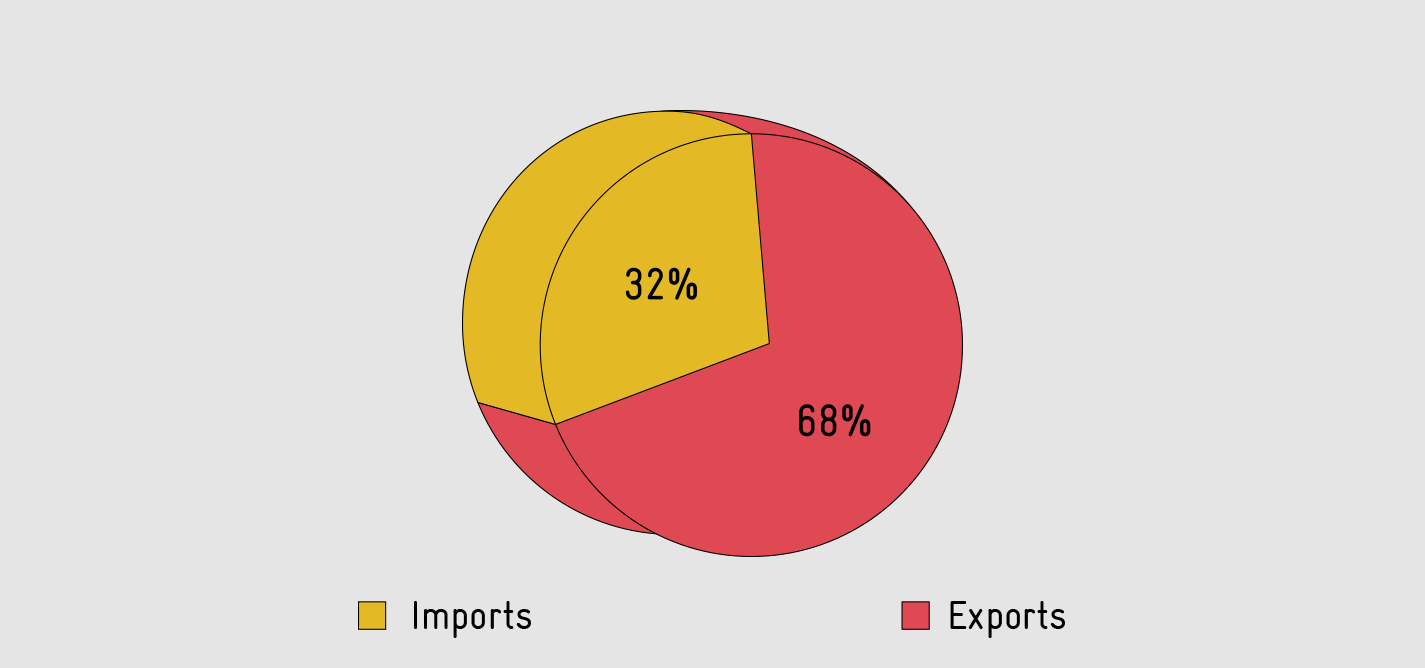In 2018, 85.3% of people employed in Kosovo were working in the services sector. However, the government’s main trade policy focus is on the goods sector which is outperformed by services 10 times over. It is time that the government re-think it’s trade policy focus to help support and build on the service sector in Kosovo.
I have a master’s degree in public administration and currently work on trade policies. Many people I meet do not understand what is meant by “services” and usually think of government services like birth certificates and passports.
Examples of economic services are: barbers or hairdressers, call centers, consulting, medical treatment, restaurants and retail. In other words services don’t circulate in the economy independently of the recipient.

Percentage of Kosovo’s GDP for both goods and services, 2018.
Goods, on the other hand, have a clear definition and have physical attributes; goods can be owned, touched and sensed. Goods can be distributed to different places at different times without changing their identity. There is no consensus of a definition of services, but generally they are defined by their: intangibility, variability, perishability and inseparability.
The Economists Bo Edvardsson and Evart Gummesson describe them as “things that can be bought and sold, but not dropped on your foot.” in their 1988 book, “Management and the Service Community.”
According to the World Trade Organisation (WTO), services are categorized into 12 main sectors: business and professional, communication, construction and related services, distribution, education, energy, environmental, financial, health and social services, tourism, transport. Each of these main sectors together have 120 sub sectors.
The tradability of services has significantly increased in recent years due to international trade policies and technological developments. Previously, companies handled their own services like legal, accounting and related services. Nowadays, even in Kosovo, many companies outsource these activities.

Kosovo’s goods sector import & export, 2018.
The trade in services in Kosovo
Over the past 10 years, Kosovo has had a negative balance in the trade in goods. In 2018 the trade imbalance on goods was around 368 million euros of exports versus 3.34 billion euros of imports. Meaning that Kosovo largely imports goods — it does not export them.
Kosovo’s trade in services in 2018, however, stood at 2.26 billion euros; of that amount, total exports were 1.5 billion euros and total imports were 705.8 million euros. The services sector is the only sector performing with a positive balance.
The top five export sectors during 2018 were travel services and other business services, a term that includes ICT, consultancy, construction and transport. Travel exports have a value of 1.23 billion euros. The high amount of export in this sector is mainly due to diaspora visits to Kosovo and only a small percentage is attributed to business travel and other tourists.
The computer, information and telecommunication services sector has the highest productivity, meaning it has the highest effect in further developing other services sectors. It accounted for 55.8 million euros in 2018, an increase of 9.2 million euros compared to 2017. Construction services exports were 23.1 million euros in 2018.
Even though the transport sector has 41.8 million euros in export together with insurance, pension and financial services, these sectors do have a negative balance. In order to rectify this, it is necessary to deeply analyze these areas and meet directly with services suppliers to identify the obstacles. This must be done by the government.
The role of services in economic growth
In 2018, the service sector, in total, contributed to the generation of added value by accounting for 71.65% of Kosovo’s total GDP. The largest category within the services sector in 2018 was retail and wholesale trade / automobile reparations, that accounts for 13.2 % of total GDP.
The second largest category is public administration, accounting for 12.9% of the GDP. The third largest category in the services sector is construction which accounts for 7.8% of GDP. Another important category in the services sector is real estate, which accounts for 7.56% of GDP.
This data shows that though services are growing very dynamically, Kosovo is mostly expanding into low productivity services like restaurants and retail services. Kosovo needs to focus on increasing the high productivity service sectors, like research and development, ICT, and professional services. This could be done by providing better trade policies focusing on improving access to international financial services like PayPal, for example. This would allow an increase of financial transfers to and from Kosovo.

Kosovo’s services imports & exports, 2018.
Trade policy and access to finance
Trade in services are very complex to deal with, there is no “one size fits all” policy. It has to be defined by sector in the light of developmental, social and cultural objectives. Services have different requirements. For example, a farmer with a certain amount of land and equipment can apply to any commercial bank for loans. A bank will assess the documentation of his collateral assets and grant the loan based on that.
A registered consulting, engineering or software developing company might only need a computer to offer services, potentially even from their apartment. Many service companies do not have assets that can be provided as collateral, therefore a different approach to financing might be required. The Government of Kosovo needs to start thinking about trade policies to support the service sector and facilitate service companies, especially by helping startups have better access to finance.
Next steps
Despite the service sector’s overall positive balance, this sector is not yet performing to its potential, and the services trade is heavily dependent on the diaspora.
Other important factors that can have a positive effect in further developing services and trade in services is for companies in this sector to have better access to finance and an improvement in gathering data. The government should consider a plan to promote services exports in this very dynamic and important sector.
In order to further increase and develop this sector and orient services to high productivity areas, Kosovo urgently needs to make a national assessment of services and trade in services by sectors. Kosovo needs to define national and sectoral services development policies and identify what strategies and policies should be drafted and implemented to enhance the service sector’s contribution to trade and development.
Feature image: Arrita Katona / K2.0.




